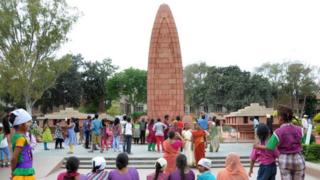May calls Amritsar massacre ‘shameful scar’
UK Prime Minister Theresa May has described the 1919 Amritsar massacre as a “shameful scar” on Britain’s history in India.
Speaking in Britain’s parliament, Mrs May reiterated the “regret” expressed by previous prime ministers.
Her statement, however, fell short of a formal apology that some people have called for.
Hundreds of people were shot dead during the massacre – the 100th anniversary is on Saturday.
“We deeply regret what happened and the suffering caused,” Mrs May told MPs.
“The tragedy of Jallianwala Bagh of 1919 is a shameful scar on British Indian history.”
Opposition leader Jeremy Corbyn said “a full, clear and unequivocal apology” was needed.
Troops opened fire on thousands of people who had gathered at the Jallianwala Bagh public gardens in Amritsar. Some were Indian nationalists protesting against heavy war taxes and the forced conscription of Indian soldiers.
Others were celebrating the city’s Sikh Baisakhi festival and found themselves mixed up with the demonstrators.
British colonial authorities had earlier declared martial law in the city and banned public meetings due to a rise in public demonstrations.
Brigadier General Reginald Dyer was sent to disperse the crowds at Jallianwala Bagh.
Without warning, Gen Dyer blocked the exits and ordered his troops to fire on the crowd. They stopped firing 10 minutes later when their ammunition ran out.
The death toll is disputed – an inquiry set up by the colonial authorities put the figure at 379 but Indian sources put it nearer to 1,000.
The killings were condemned by the British at the time – War Secretary Winston Churchill described them as “monstrous” in 1920.
In 2013, David Cameron became the first serving UK prime minister to pay his respects at Jallianwala Bagh public gardens.
He later defended his decision not to offer an apology, saying the British government had “rightly condemned” the massacre at the time.
“I don’t think the right thing is to reach back into history and to seek out things that we should apologise for. I think the right thing to do is to acknowledge what happened, to recall what happened, to show respect and understanding for what happened,” he said.
Source: Read Full Article



